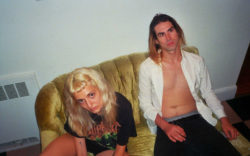Love ’em or hate ’em, over the past couple of years, the Birdhouse Collection has been responsible for some of the most vital and uncompromising music in Athens. From the sneering, propulsive art-punk of Muuy Biien to the subversive, retro-fi love-pop of K. Jared Collins’ k i d s, the collective has spanned the stylistic gamut, existing largely in an intensely insular state, self-supportive and self-assured.
It should come as no surprise, then, that its most vocal members are both brainy and brash; they bear the mark of inflexible self-confidence that is both the root of creative genius and the most glaring fault of many a foregone micro-scene, long since collapsed in on itself.
Flagpole recently sat down with members of the collective’s most experimental-minded group, the polarizing a capella/freakout squad known as Pretty Bird, for a beer and a chat about how the Birdhouse fits in the grand scheme of Athens music and how—or if—it will sustain itself going forward.
Flagpole: So, tell me about the origin and evolution of Pretty Bird.
Jacob Deel: It was originally David [Chandler]’s idea. An all-vocal rhythm project—initially, it was vocals only. He didn’t want anything else. Valerie [Lynch] was always like a joke member—she didn’t play music, and didn’t really want to. She was like, “Ha ha ha, sure.” Eventually, after terrible garage band experimentation and trying to figure out how to record music—I was just a drummer, and David has the slightest bit of keyboard knowledge, but not much, and he has no internal rhythm—we started [figuring out] how it could actually take form.
David was trying to figure out what Pretty Bird could be, and he started repeating himself, repeating himself, repeating himself, until he realized that even if you fuck up during a song, or do something that sounds weird—if you keep repeating it, almost a hundred percent of the time it will sound cool at some point… Almost like a joke that’s awkward and you think about it long enough and you eventually laugh out loud. So there was some experimentation there, just sitting around in a circle awkwardly with three people you’ve never [sung with] before, and he wanted you to repeat whatever you were saying.
We basically just [pared it down] to the people who were willing to do that. Most people aren’t willing to sing in front of people they don’t know, [or] to make any noise you can make with your mouth and feel comfortable doing it repeatedly. Jared [Collins] had this one song where he basically repeated one thing for like, nine minutes, and he said his chest cavity just started reverberating to the point where he felt like he was almost meditating. He was over-oxygenated, or something, a little bit high.
So, it can be anything. It’s headed towards hip-hop at the moment… Making it sound like us, not worrying about it being perfect. Obviously, we have our flaws as a band and as people, and we don’t want it to sound glossed over. The tracks we’ve recorded with Jesse [Mangum, at Glow Studio]—Jesse is like really, really changed since we started recording with him. He wants it to be more like raw, less perfection in the production. He wants it to sound like the people who are actually doing it. “People music” is what we call it.
FP: You mentioned hip-hop. I see you guys describe yourselves as hip-hop a lot, but I think people who come to a Pretty Bird show expecting hip-hop will be surprised. What is it that you guys take from hip-hop?
JD: Like most music, the majority of hip-hop is not good… it just doesn’t have much substance. There’s not much to glean personally from it. You can appreciate the ability to make eight words rhyme in one sentence, or, you know, being technical. Wu-Tang is amazing with what they can do with words and poetry. But then, the 90 percent of it that sucks—why does it suck? Because there’s nothing human about it.
I feel like we’re just trying to be OK with expressing ourselves. The easiest way for us to do that, at the moment, is to just say what’s on our mind. Hip-hop is an easy way to be confident in saying something ridiculous… Hip-hop artists say some pretty ridiculous shit, and people rarely question it. It’s art in its own way; if they’re saying something about cars or women, that’s what it is… And it’s pretty easy to make a hip-hop beat that can carry for two or three minutes. Not to say that it’s a cop-out—we’re currently writing some actual hip-hop songs. Of course, it’s Pretty Bird-sounding, but [with] hip-hop structure, I guess.
FP: I’ve been wondering why a band like Pretty Bird stands out so much in Athens. Do you think Athens is a musically conservative place?
JD: In the Athens universe, people are just OK with there being a hundred thousand bands. It is a good thing to encourage people to express themselves, and all that. But there is friend-rocking, and playing shows to drink beer and make money, and it’s a business. That’s where we had a hard time understanding Athens. It’s a little glossy, sometimes. It’s definitely unfocused… Playing music is for the entertainment, and for the business, more so than the actual content. It’s about making sure people are out drinking. If you’re not bringing anyone out, the bartenders aren’t gonna like you. You really have to meet people to get anyone out. You have to affect people.
If something is hyped, or something is good—whoever decided that, I don’t know—it’s weird, [this] happens at Muuy Biien shows: people will just disappear, and then we’ll start setting up and the room will be packed out. And it’s like, who’s texting who? “Come back, they’re setting up.” [But] people realize what’s good when they hear it… People like you, but also you have to kinda be good for the town, too. It’s a hard town to entertain.
FP: Are you guys still gonna stop playing live after this show?
JD: [Laughs] This is David [makes wavy gesture with arms]. I reference Muuy Biien because all our bands are very intertwined—forward motion. David is a forward motion kinda guy. If he feels stagnant, he loses his goddamn mind. He’ll break the whole thing up then and end it. But really, he’s just trying to kickstart you back up. He’s this intelligent, focused guy and he could do whatever he wanted. He wants to make sure we’re all on the same page, and moving forward and getting things done.
FP: What does the Birdhouse Collection mean to you?
JD: There was the geography of it—we were all crammed into a room—and then there was the realization that all of us were similar. We sort of saw ourselves as a complete group of ideas, [or] one idea in seven different ways. When I do my stuff [as Cottonmouth], it’s really loud and heavy, but it’s just [like] Pretty Bird, I don’t use many instruments… We all saw ourselves headed in the same direction, and wanting the same things. And we include people we feel are doing cool shit, like we put The Rodney Kings on the last mixtape.
We just want to force people to do creative things, and be competitive, in a way. I feel like Jared not being in Pretty Bird has really amped him up to make himself successful. And we love him, he’s doing great. There’s no hard feelings between anyone in the whole group… We all just know that we work together well. Every once in a while, we email everybody and say, “we’re making a compilation, make a new song.” That’s fun for us, to sort of force it on everybody.
FP: Where does Pretty Bird fit in the Athens music spectrum?
David Chandler: Where Pretty Bird fits in is the Birdhouse Collection. All of us coming to Athens as musicians, in this very expansive music scene that literally stretches two parts of town, very different ends—when we came here, there were established bands on both ends, and they weren’t very friendly, most of them. So we just kept doing what we were doing, and I think we just naturally saw a camaraderie with our aesthetics, our presentation, just what we think a show should be. We’re music lovers, but we’re also music haters just as much.
Josh Evans [Muuy Biien]: I think our hatred for music fuels our love for it.
DC: They’ve got firecrackers, we’ve got a bonfire. We’re gonna slow burn with that hot heat… The fact that you can look at an artist, where they’re at in this moment, and you can feel what you feel from them, but will it translate to these other moments? Is it actually a foundation that is taking music—or, not even music; fuck music, because nothing’s new—are you taking someone’s emotions, are you grabbing ahold of them, or is it like, please climb into my rowboat? [With] mainstream music, I feel like we’ve been in a plateau since 2009. There were fabulous years before PIPA, or SOPA, or whatever, when music was really free…
FP: Isn’t the concept of “mainstream music” slowly evaporating?
DC: It’s true, but before 2009 the Internet was with the revolution. And now, here we are—music’s still free, but the music searchers, the guys who it’s their profession to find the cool shit, they’re pushing Kendrick Lamar. And there are quality tracks in the things they’re pushing, but what I am sort of doubtful about is whether these giant blogs are not just going to turn into the [new] mainstream model… You’ve got no room for context. Just context of like, what other indie-sounding bullshit track is Best New Music right before it. These bands that are “up and coming,” it just makes me question what is really going on.
FP: Does that make you guys feel discouraged?
JD: It amps us, in a way.
DC: It’s like, fuck ’em… What else would we be doing? We’re having fun, and that’s what’s important. If anything, how it affects me most is not letting it get into my head, in my own writing process. At this point, we’re trying to leave the proper breadcrumb trail from music where it’s at to where we say it could be going and still be music. Wanting people to hear it and get it and like it, that’s what fucks with me, and that’s where I have to say “No, fuck everybody’s opinion—nobody else knows how to do this like we do.”
FP: There tend to be these kind of micro-scenes that pop up throughout the years, these really intense and inspiring bursts of creativity. Then people other move, or break up, and it fizzles out. What do you envision for the future of the Birdhouse Collection?
JD: We love and appreciate this town. We’re all from Georgia. It’s always been [about] the magnetism of the music scene here. Me and David lived in Atlanta for a little while, doing our band we were doing post-high school… [But] it was always like, get to Athens, it’ll be like, not easier, but, you know, easier [laughs]. And in a lot of ways, it was, but it wasn’t that easy, really. You have to meet everybody. We didn’t like [Farm 255 talent buyer] Mercer [West] for a long time, and we didn’t feel like he liked us. Knowing him now, I know he was just like, “Who are these dweebs?”
I don’t think we’re ever gonna cold-shoulder Athens. There will always at least be a base here, whether or not we live somewhere else for a while… We don’t plan on confining ourselves here. We do plan on experiencing the world a little more broadly. But of course we feel like this is home, in a way, especially during these formative years…
I knocked this girl over at a show. I’m dancing in the crowd, and I knock her over and don’t realize it. Next thing I know, her sister’s flying out of the crowd… Boom! Punches me, punches me, punches me again… They’re holding her back, and she’s trying to get me. And I’m holding birds in her face, and it just turns into this big brawl. I’m turning around like, who else is with her? And these guys are muggin’ me. Eventually, I meet everybody, and I’m like, “sorry, guys, I didn’t know what was going on, this bitch hit me in the face.” I meet them, they’re great, I start working with this girl at work, and it’s the girl I knocked over—her sister punched me in the face, and they’re coming over to my house and hanging out now. [Athens is] nice that way.
Pretty Bird plays Caledonia Lounge on Saturday, Mar. 30 as part of k i d s’ live EP recording show.
Like what you just read? Support Flagpole by making a donation today. Every dollar you give helps fund our ongoing mission to provide Athens with quality, independent journalism.










